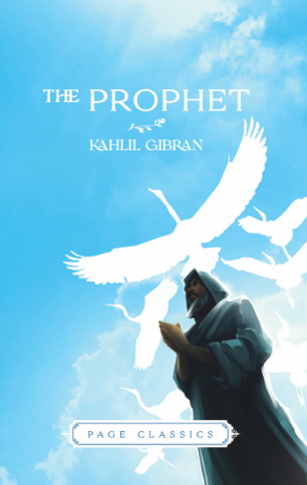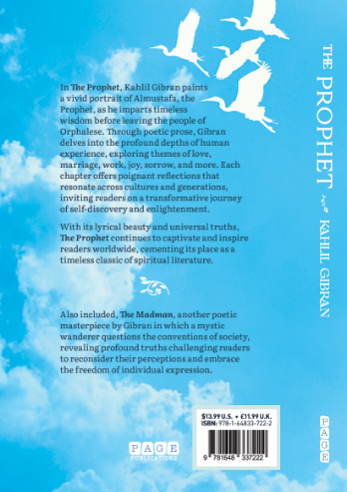The Prophet Kahlil Gibran
- Regular price
- $6.99 USD
- Regular price
-
$13.99 USD - Sale price
- $6.99 USD
- Unit price
- per
Type : Classic Literature
SKU : 9781648337222
Couldn't load pickup availability
The Prophet by Khalil Gibran is a timeless collection of 26 poetic essays, first published in 1923. Written in English, the book blends philosophy, spirituality, and artistic expression*, offering profound reflections on a wide range of human experiences. It is one of Gibran's most famous and widely read works, revered for its lyrical language, spiritual insights, and deep exploration of life's core questions.
The story is set in the city of Orphalese, where the prophet Almustafa has lived in exile for twelve years. As he prepares to board a ship that will take him home, a group of city dwellers gathers around him, asking for his wisdom on various aspects of life. What follows is a series of meditations in which Almustafa shares his insights on topics as diverse as love, work, freedom, and death, offering spiritual and philosophical guidance that resonates with readers across time and cultures.
Each chapter of The Prophet addresses a particular theme or question about the human condition. Some of the most notable topics include:
1. Love: Gibran explores love as a force that transcends human emotions, a transformative power that connects individuals and makes them whole.
2. Marriage: He speaks of marriage as a union of souls but emphasizes the importance of personal freedom and individuality within the relationship.
3. Children: Almustafa teaches that children are not possessions but the arrows sent forth by parents to fulfill their own destinies.
4. Work: The prophet views work as a means of expressing one's essence and fulfilling a divine purpose.
5. Joy and Sorrow: Gibran presents joy and sorrow as inseparable; one cannot exist without the other, as both are part of the human experience.
6. Freedom: He reflects on the concept of freedom as both an inner and outer experience, not merely the absence of constraints but the liberation of the soul.
7. Pain and Self-Knowledge: Pain is portrayed as a teacher, one that brings wisdom and self-awareness through the process of suffering.
8. Death: Death, for Gibran, is not an end but a return to the source, a transition into another form of existence.
The beauty of The Prophet lies in its ability to speak to both the individual and the collective. It offers a deeply personal, introspective journey, while also addressing universal themes of humanity, spirituality, and existence. The book’s poetic style and philosophical depth make it a rich resource for reflection, meditation, and inspiration.
Though written nearly a century ago, The Prophet remains relevant today because it speaks to universal truths that transcend culture, religion, and time. The wisdom conveyed by Almustafa—who embodies a blend of Eastern spirituality and Western philosophical thought—offers insights that are just as applicable in contemporary life as they were in the early 20th century.
Overall, The Prophet continues to captivate readers with its elegant prose, profound wisdom, and timeless exploration of life’s essential questions. It is a book that has touched the hearts of millions, inspiring readers to find deeper meaning, inner peace, and a greater understanding of the human experience.
5.1 x 7.87 (Inches)
132 Pages



